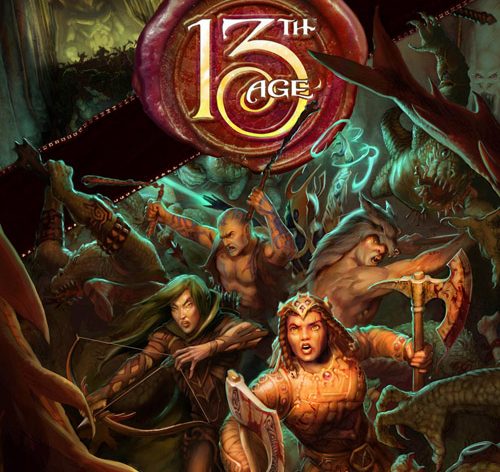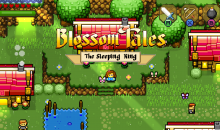Newbie GM Tips from 13th Age
As I’ve talked about on our podcast (you know, the one you’ve already rated 5 stars on iTunes?), I’ve recently begun running my first legitimate tabletop game, a campaign using 13th Age. Last week my players finished the campaign’s first dungeon crawl, which marked a pretty cool achievement for me as well, since this was my first attempt at dungeon-running. 13th Age is an excellent system for newbie GMs like me to start off with and creating a dungeon from scratch has been a great learning experience. Here’s some tips I’ve learned over the last few sessions to help out other burgeoning GMs.
Failing and Failing Forward
The first thing I told my players during character creation was ‘I haven’t GM’d a tabletop before, much less in this brand new system, so bear with me. I apologize in advance, because there will be mistakes.‘ This kind of transparency has taken me a long way in being honest with my players about the game. I’ve made a few misteps (including a combat that accidentally could have easily killed all of them, WHOOPS), but no one’s flipped the table and ragequit on me yet. Ask for feedback, honest feedback, and be very willing to listen to your players. It can be hard to not be defensive or discouraged, but I try to look at every session as a learning experience, and take at least one lesson away from it.
Speaking of failing – one of the definite things we’re all used to with rolling dice is when we roll is when we just miss that DC or roll a natural 1. Before I GM’d, I always thought, ‘well, that’s that, I guess I’m just not getting this.’ I’ve become a huge convert of one of 13th Age’s core philosphies (which is widely applicable to other systems): “Fail Forward.” Doing nothing isn’t fun for the player OR the GM. Fail Forward is the (awesome) idea of a failure still moving the story and action forward but in an unexpected and sometimes difficult fashion; such as having the player accomplish what they want to do but OH NO it comes with a condition that hella complicates the situation. There’s worlds of possibilities when you fail forward and I personally think that most of the time doing something is better than doing nothing. Just be careful that fail forward doesn’t penalize your players unfairly hard for a fail – the idea is to get things moving, not to grind them in place with too much to overcome.
Telling Your Story vs Guiding the Special Snowflakes
The name of the game is ‘player agency.’ I don’t want my players to feel like they’re just pawns in a story that’s already set in stone – if I wanted to do that, I wouldn’t be playing an interactive game. When I’m setting up an exciting adventure, I try to make each area open enough that there’s no one right way for the players to try to accomplish their goals. This goes for everything: social encounters, terrain hazards, combat, etc. This might sound complicated at first, but it’s actually a lot of fun and I think minimizes the work – at least in a very ‘freeform’ feeling game like 13th Age, which thrives off such open-endedness. Sometimes it’s as simple as setting up some gang leaders for the party to try and bargain with, sometimes it’s as complicated as creating a countdown system with bosses increasing the timer and letting players figure out how they want to go about decreasing the timer (last time I used DOOM tokens, one of the best things I’ve come up with).
I’ve even learned to avoid the idea that linear dungeons are bad, which is something that’s stuck with me since I first started playing JRPGs. My first dungeon wasn’t a complicated, six-part grid map that I’ve seen some far more experienced GMs use, it was a simple series of tunnels/caverns rooms leading down to an abandoned drow city and a demon’s ritual chamber. 13th Age was again, perfect for this – the game is gridless and encourages creativity over giving PCs a big powers tookit. I gave the players the choice in how they wanted to navigate this place, what they wanted to look for and how they wanted to handle what they found in each area, instead of saying ‘here’s some guys to fight.’ The final leg of the dungeon even proved the linear-feel to work to my advantage, as the the players had to race out through a gauntlet of invading zombies. I gave the players the choice of how THEY wanted to get out. After that, everything that they encountered spawned from their choices rather than my shoehorn.
Nothing is Inconsequential
Some games have more roleplay than other games. It’s totally dependant on system, setting, players and most of all, the GM. Personally, I love to see characters with unique stories, backgrounds and personalities all coming together to interact with the world and each other. Since roleplay is so important to my game, I want to keep the immersion and story central at all points. This means that everything the PCs interact with does something. The dungeon they just finished was presented to them as a side-quest that they decided to take on, but once inside they found a ton of information about machinations going on in the world as well as accidentally getting a touch high on magic (ACTUALLY MAGIC) mushrooms and having visions of events happening beyond themselves. Having events like this happen made my players feel like they weren’t wasting their time and wove them into the world I’m guiding them through. I feel strongly that GMing isn’t just rolling out a series of scenes, it’s much more like spinning a web.
It’s a lot scary to break out of being a player and taking up running a game – it’s more responsibility and effort, with a lot less control than you might think. But it’s incredibly rewarding; there’s nothing quite like watching your friends experience all the cool stuf you’ve built just for them. Give it a try, it’s worth the work. And consider giving it a try with 13th Age, an easy to learn system that makes the work fun.
You can reserve your very-soon-to-be-released copy of the 13th Age Core Book from Pelgrane Press Ltd. here, which comes with immediate access to a full PDF. If you’re GMing a 13th Age campaign, also make sure to check our their Resources page, which has some excellent tools for running a game.






